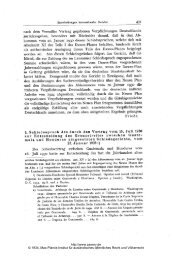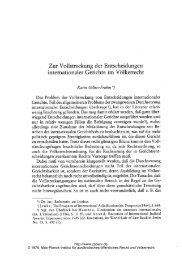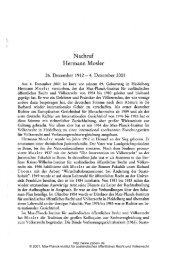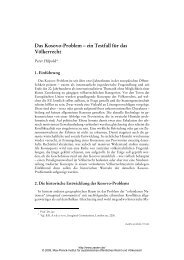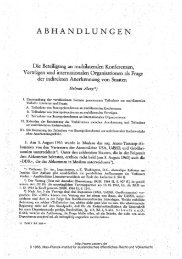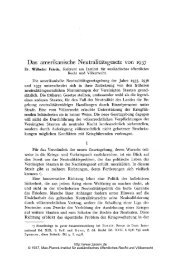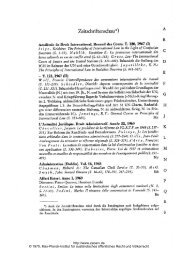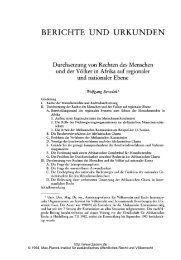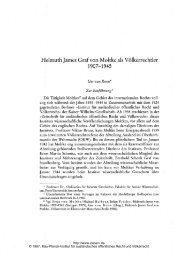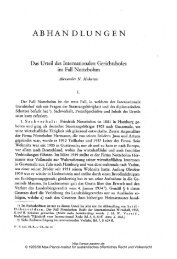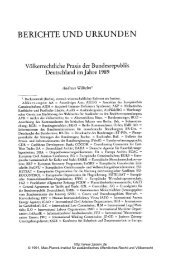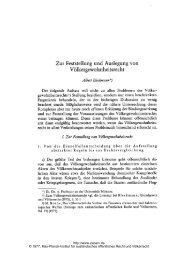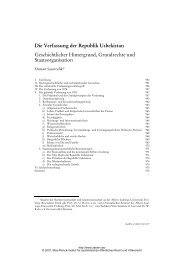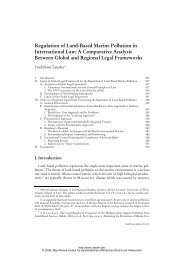bUe and Abuse of the Indian ConstitutionnD - Zeitschrift für ...
bUe and Abuse of the Indian ConstitutionnD - Zeitschrift für ...
bUe and Abuse of the Indian ConstitutionnD - Zeitschrift für ...
Create successful ePaper yourself
Turn your PDF publications into a flip-book with our unique Google optimized e-Paper software.
Use <strong>and</strong> <strong>Abuse</strong> <strong>of</strong> <strong>the</strong> <strong>Indian</strong> Constitution 835investigation or <strong>the</strong> prosecution or both were lacking. The Court held that, by virtue<strong>of</strong> article 32 read with article 142, where <strong>the</strong>re is inaction by <strong>the</strong> Executive in<strong>the</strong> matter <strong>of</strong> observance <strong>of</strong> <strong>the</strong> Rule <strong>of</strong> Law or <strong>of</strong> human rights, <strong>the</strong> judiciarymuststep in to provide a solution till such time as <strong>the</strong> Legislature acts to performits role by enacting a proper legislation to cover <strong>the</strong> field. The Court <strong>the</strong>n proceededto direct that <strong>the</strong> CBI be given statutory status, that <strong>the</strong> Central VigilanceCommissioner (CVC) be appointed by <strong>the</strong> President on <strong>the</strong> basis <strong>of</strong> recommendations<strong>of</strong> a Committee consisting <strong>of</strong>, among o<strong>the</strong>rs, <strong>the</strong> Prime Minister <strong>and</strong>Leader <strong>of</strong> <strong>the</strong> Opposition, that <strong>the</strong> CVC should be responsible for <strong>the</strong> efficientfunctioning <strong>of</strong> <strong>the</strong> CBI, that proposals for improvement <strong>of</strong> infrastructure, methods<strong>of</strong> investigation should be decided urgently, etc. The Court gave similar directionsin respect <strong>of</strong> <strong>the</strong> Enforcement Directorate, Prosecuting Counsel, appointment<strong>of</strong> special counsel, etc. These directions were, no doubt, <strong>the</strong> product <strong>of</strong> <strong>the</strong>Court's eagerness to deal with corruption, particularly at high places.The Vineet Narain judgment can be faulted on several grounds. It ought to havebeen clear to <strong>the</strong> Court from <strong>the</strong> time it looked into <strong>the</strong> case that its monitoringrole would exert enormouspressure on <strong>the</strong> CBI to file charge-sheets in <strong>the</strong> competentcourt. It may not be fair for <strong>the</strong> Court to accuse ei<strong>the</strong>r <strong>the</strong> investigation or<strong>the</strong> prosecution for <strong>the</strong> discharge <strong>of</strong> <strong>the</strong> accused. There could be no serious objectionto <strong>the</strong> Court directing CBI to investigate <strong>the</strong> allegations, since it felt that thatbody failed in performing its duty; but <strong>the</strong> Court going beyond that in its activistrole through <strong>the</strong> medium <strong>of</strong> what it called "continuing m<strong>and</strong>amus" caused irreparabledamage to <strong>the</strong> reputation <strong>of</strong> scores <strong>of</strong> high functionaries for no fault <strong>of</strong><strong>the</strong>irs.The declaration that <strong>the</strong> Supreme Court could legislate till <strong>the</strong> Legislature occupies<strong>the</strong> field is a mere affirmation without any support from articles 32 <strong>and</strong> 142,<strong>the</strong> articles claimed by <strong>the</strong> Court as supporting such a declaration; it undermines<strong>the</strong> principle <strong>of</strong> separation <strong>of</strong> powers. The legislative <strong>and</strong> executive measures directedby <strong>the</strong> Supreme Court are accordingly unsupportable; in ordering <strong>the</strong>m,<strong>the</strong> Court is also getting into a sphere in which it has no Iexperience or special insightat all <strong>and</strong> on that account may end up making mistakes affecting its credibilityas a judicial organ <strong>of</strong> <strong>the</strong> State. Look at what happened in Unnikrishnan v.State <strong>of</strong>A.P., wherein <strong>the</strong> Supreme Court thought it fit to frame a detailed schemefor admission to, <strong>and</strong> fees chargeable by, private medical engineering <strong>and</strong> certaino<strong>the</strong>r pr<strong>of</strong>essional colleges.151 The scheme was no doubt intended to check commercialisation<strong>and</strong> pr<strong>of</strong>it-making by private institutions. Many times <strong>the</strong>reafter ithad to clarify <strong>and</strong> modify that scheme.152 Instead <strong>of</strong> interpreting <strong>the</strong> Constitution,<strong>the</strong> Court is now engaged in interpreting <strong>the</strong> meaning <strong>and</strong> scope <strong>of</strong> its administra-151-Supra note 93, at 2247 2250.152 See Unnikrishnan v. State <strong>of</strong> A.P., (1993) 4 SCC 111; TM.A. Pai Foundation (I) v. State <strong>of</strong> Karnataka,(1993) 4 SCC 276; TM.A. Pai Foundation v. State <strong>of</strong> Karnataka <strong>and</strong> O<strong>the</strong>rs, (1994) 2 SCC199; Manipal Academy <strong>of</strong> Higher Education v. State <strong>of</strong> Karnataka, (1994) 2 SCC 283; TM.A. PaiFoundation v. State <strong>of</strong> Karnataka, (1994) 2 SCC 734; Paval Ammal Vaiyapuri Educational Trust V.TR. RameshGovernment <strong>of</strong> TN., (1994) 6 SCC 259; Institute <strong>of</strong> Human Resources Development v.http://www.zaoerv.de© 1998, Max-Planck-Institut für ausländisches öffentliches Recht und Völkerrecht



